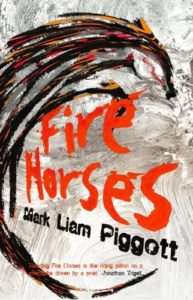 Joe Noone seems to have it all – a beautiful house built into a Mallorca hillside, a comfortable lifestyle, a beautiful girlfriend. Yet it’s New Year’s Eve 2007 and as fireworks go off around him and people celebrate, he seems sad and, despite being in the middle of a party, strangely lonely. In the rest of the book, through a series of extended flashbacks to various events over the previous 25 years, we gradually discover why.
Joe Noone seems to have it all – a beautiful house built into a Mallorca hillside, a comfortable lifestyle, a beautiful girlfriend. Yet it’s New Year’s Eve 2007 and as fireworks go off around him and people celebrate, he seems sad and, despite being in the middle of a party, strangely lonely. In the rest of the book, through a series of extended flashbacks to various events over the previous 25 years, we gradually discover why.
It’s interesting that what hooked me about this book from the first page was the writing rather than the story. Usually it’s the other way round – I need to care about the characters, and can’t tolerate good writing just for the sake of it. But in this case, while I could have lived without discovering the cause of Joe’s malaise, I kept reading simply because I liked the sound of the narrator’s voice. I loved the opening image of the ancient village walls absorbing the cheers of gaudy revellers “like bread dipped in wine”, and Joe’s chewing on an empty grape sac perfectly shows the emptiness of his life amid the firecrackers and celebrations around him.
Fortunately I became more interested in Joe as the story progressed from 1980s Yorkshire adolescence through London squatting, love lives and losses, deaths, betrayals and a lot more. Oddly, I got the strongest sense of him through his relationships with women – Becky, Hermione and Alona, and to a lesser extent Julie. With the male friends, first Stig and then Tony, I never had a clear sense of what the friendship was based on. Perhaps this is a comment on male friendships, which can be more superficial – at several points, Joe tries to talk more seriously to Tony and is either cut off or given the signal for “You’re boring me”. But because the friendship with Tony is such a large part of the book, it seems odd that I didn’t really understand it. There are plenty of stories about things they do together, but apart from the competitiveness and rivalry, mostly over women, I didn’t really ‘get it’.
I think perhaps it’s partly due to the structure of the story, covering a lot of ground, each chapter a different year. Tony’s introduced in 1982 as Joe’s “implacable foe” who he throws a snowball at, then disappears for a while until a year later they’re forced to do a school project together, then disappears again until it’s 1985 and they meet in London and seem to be friends. With the women, the relationships seem more solid because Joe lives with them and there are whole chapters devoted to them. Tony seems to slip in and out of the story and so, although he’s central to the plot, the foundation of the friendship never feels very solid.
Despite that, the book is a compelling read, both for the development of Joe through the decades and for the backdrop of Britain changing just as much in the same period. There are some great political comments – again, something I normally don’t like too much in fiction, but here they really work well (perhaps because I agree with them!). In this book you can really feel Britain being ripped apart in the 80s, limping through the 90s, and sinking to such a new depth of banality in the Blair years that the only sensible response is to leave the country.
It’s a bleak book but shot through with humour and hope. Joe appears to have ‘given up’ for much of his life, living on the dole and drinking himself into oblivion, but really he’s like that because he hasn’t given up, can’t give up on his dream of a better life, a better world and finding love. He’s self-destructive but I understand why, and although it takes him years to make progress, and he often goes back more often than forward, he does get there in the end, just about, having paid a huge price, and isn’t that really how most of us live our lives?


